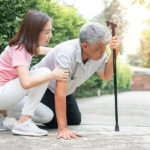Here Today, Gone Tomorrow
By Bonnie Jenkins, Advanced Natural Wellness
I was having dinner with my son the other night when he started complaining about his receding hairline. I can understand his concern, especially since my father lost his hair when he was just a few years older than my son.
Luckily, we know a lot more about hair loss then we did back when my dad was in his late-20s. For example, we know that the hair follicles in people with hereditary hair loss are smaller than in folks with a full head of hair. We also know that dihydrotestosterone (DHT) is implicated in hair loss. DHT is created from testosterone via an enzyme known as 5-alpha reductase.
These discoveries have lead pharmaceutical companies on a quest to find a cure for hair loss. And if you listen to the hype, they’ve succeeded. But, while these new drugs have been shown to stop, and even reverse the problem, the cure may very well be worse than the disease.
Bad Hair Daze
Originally used to treat prostrate enlargement in men, finasteride (marketed under the brand name Propecia) has been found to reverse some types of hair loss. Approved by the FDA as a prescription drug to be used by men only, finasteride works by interfering with the conversion of testosterone to DHT. But the side effects can be serious. Along with the occurrence of impotence in the men studied, researchers caution that use of the drug, even at a reduced dosage, may result in birth defects in male offspring. While there are no studies on the safety of long-term use, some of the other side effects noted during the clinical trials included dizziness, headaches, loss of strength, abdominal pain, diarrhea and difficulty urinating.
MD Exposes the Hidden Danger to Your Eyes

When your eyesight starts to fail, it's a real problem. Suddenly you can't go to the grocery store... you can't get to the doctor if you have an emergency... you can't meet your friends for dinner…
Your "regular" doctor doesn't have time to keep up with the latest research. And the same goes for eye doctors. They go to school to learn how to fit you for glasses and contacts, but have no way of preventing the damage and loss of eyesight that threatens your freedom and independence.
Let me show you something that explains a LOT about how your eyes work.
In my FREE Special Report, I'll show you a HUGE, untapped resource for your eyes that safely and naturally restores clear, effortless eyesight.
Click here to get started...
Women in their reproductive years are warned not to take finasteride under any circumstances – not even to touch the pills since handling may lead to absorption of the drug through the skin. And research has shown that the drug doesn’t work in women anyway. In one double-blind, placebo-controlled study, researchers at the University of California-San Francisco had 137 postmenopausal women take either one mg. of finasteride or a placebo. After one year, the researchers saw no significant difference in the amount of hair loss between the two groups.
Another product approved by the FDA to treat hair loss is Rogaine, a topical minoxidil solution. Hailed by marketers as a miracle cure, Rogaine is available over-the-counter in two different strengths. But Rogaine doesn’t work for everyone and the quality of re-growth is often poor. And the drug isn’t without side effects. Rogaine can cause low blood pressure, kidney stones, allergic reactions, blurred vision and swelling of the ankles and feet. More serious, however, a Hungarian study found that using minoxidil can result in changes to the heart, and the manufacturer cautions women who are pregnant, attempting pregnancy or breast-feeding to avoid using the product.
Are Propecia and Rogaine really worth the risk? While some men and women will do anything to halt hair loss, these drugs aren’t something I’d recommend to my son. Fortunately, there are safer options.
When Bald Isn’t Beautiful
Last year a pilot study came out of Colorado on saw palmetto’s ability to improve hair loss. Wait a minute – isn’t saw palmetto the same herb used to promote prostate health? You bet! And it makes sense if you think about it since the herb blocks 5-alpha reductase – the enzyme implicated in both balding and benign prostate hyperplasia.
In the same study, researchers found that beta-sitosterol also had an equally positive impact on reversing hair loss. Beta-sitosterol is one of several sterols found in almost all plants. Since high levels are found in rice, wheat germ, corn and soybeans, it’s a good idea to include more of these foods in your diet. You can also supplement your dietary intake by taking 60 to 130 mg. of beta-sitosterol.
The World's Quickest Solution for Ending Prostate and Urinary Misery
This has recently been revealed to be one of the only real breakthroughs in prostate health.
The seeds of a strange fruit (sometimes called "Chinese Apples") hold powerful phytonutrients that are a revolution in prostate health.
In fact, UCLA and Veterans Administration research have now proved this to be true.
Not only that, but it may be the worlds quickest solution for ending prostate misery.
Simply stated, these phytonutrients represent a huge step beyond beta sitosterol, saw palmetto, and other phytosterols alone.
Simply click HERE if you want to have fast prostate relief...restful, uninterrupted sleep...no more constant "urges to go"...enhanced virility...and optimal prostate support for life.
Other research has linked iron and l-lysine deficiencies to hair loss. In one review, British researchers noted that double-blind data showed that women with increased hair shedding respond well to iron and l-lysine therapy. But before you start taking supplemental iron, have your iron levels checked since taking too much of this mineral may increase your risk of tuberculosis, Parkinson’s disease and Alzheimer’s disease.
L-cysteine is another nutrient that may help you hang onto your hair. This sulfur-rich amino acid is important to healthy hair and nutritionists have long heralded its use, not only for preventing hair loss, but also for improving hair quality and texture. A study by German researchers found that L-cysteine is essential to the health of the scalp and the regular cycle of hair loss and regeneration.
One Last Thing . . .
If you’re losing hair because of poor circulation, massage your scalp daily to get the blood going. Sprinkling a few drops of a stimulating essential oil, such as rosemary or lavender, on your fingertips before massaging your scalp may increase the effectiveness of the massage. Other herbs traditionally believed to stimulate and strengthen new growth include bay, birch, calendula, horsetail, nettle and sage.
This Just In . . .
While healthy hair can make you look good, keeping what’s under your “do” in top form is even more important. New research has found that taking high amounts of vitamin C and E can slow age-related cognitive decline. One study in particular found that very high-dose vitamin E supplements delayed the progression of Alzheimer’s disease.
In the study, researchers tested the cognitive function of nearly 15,000 women, ages 70-79, participating in the Nurses’ Health Study. The tests included memory, immediate and delayed recall of lists of words, and tests of verbal fluency. For example, one of the tests asked women to name as many animals as they could in one minute. The test scores were then compared with the subjects’ use of vitamin E and C supplements.
It seems that the women who had been taking both vitamin E and vitamin C supplements had significantly better cognitive performance than women who had never taken those supplements. The analyses also found that women who have taken vitamin C and E supplements for at least 10 years maintained better cognitive function in their 70s, compared with women who took only one of the vitamins or none at all.
So despite recent reports bashing the effectiveness of antioxidant vitamins, studies like this remind us that Mother Nature really does provide all of the protection we need to live long, healthy and fully aware lives.
References:
Grodstein F, et al. “High-dose antioxidant supplements and cognitive function in community-dwelling women.” American Journal of Clinical Nutrition. 2003; 77:975-984.
Price VH, et al. “Lack of efficacy of finasteride in postmenopausal women with andorgenetic alopecia.” Journal of the American Academy of Dermatology. 2000; 43:768-776.
Roth W. “Cathepsin L deficiency as molecular defect of furless: hyperproliferation of keratinocytes and pertubation of hair follicle cycling.” FASEB Journal. 2000; 14:2075-2086.
Rushton DH. “Nutritional factors and hair loss.” Clinical Experimental Dermatology. 2002; 27:396-404






